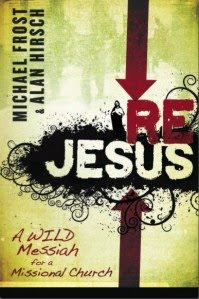
The fourth question Michael Frost and Alan Hirsch say we need to always be asking in their book ReJesus is:
In how many ways do we domesticate the radical Revolutionary in order to sustain our religion and religiosity?
62. Ok, Michael and Alan are not actually looking for a number. But I couldn’t resist.
Personally, I feel that this question is a little loaded. It implies that we most certainly do domesticate Christ in order to sustain our religion and religiosity. Do we? Alan and Michael make a strong case that we do. They say rituals (religion and religiosity?), which do have a vital purpose in sustaining faith, often become a way in which we avoid God.
“Although genuine faith is born out of direct encounters with God, it cannot survive and prosper without some form of stability and order. Viewed positively, rituals, creeds, and organizations can help people structure their relationship with God. In fact, we believe this is what they initially were designed for. But unless the worshipper is very wary, the glory of the God encounter will fade and the ritual, creeds, and rules intended to preserve the encounter will take its place.”
Encountering God is a little bit scary. It is beautiful and glorious and amazing. And he is full of love and grace and mercy. But he is still God – the creator of the world – and often the encounters with him end up changing me (which is scary). So often we want someone to meet with God on our behalf (Moses to go up the mountain and let us know what God said). And this is what we do with our religion and religiosity, we use it to keep Jesus away from us, to make sure he is tame and does not challenge us. Instead of going to God personally we do rituals. For example we go to church Sunday morning to hear what the preacher discovered in his encounter with God instead of meeting with God during the week ourselves. Instead of reading the bible we read what others have written about the bible. Now please understand me, I do believe that going to church and reading books is a good thing – but it should never replace our own encounter with God.
What rituals, creeds, organizations have you found help give structure to your relationship with God?
What rituals, creeds, organizations have lead you to keeping Jesus at a distance?






























